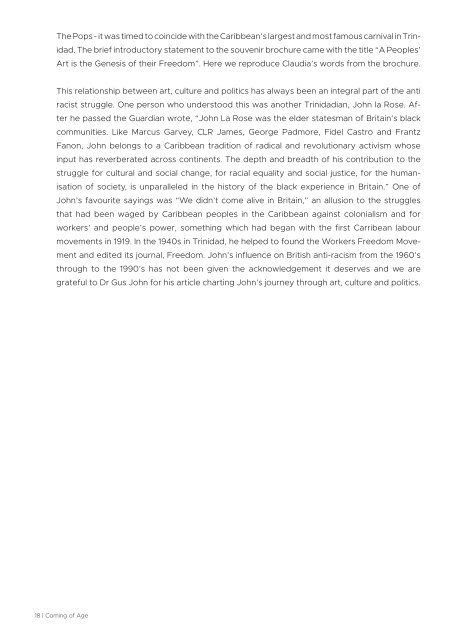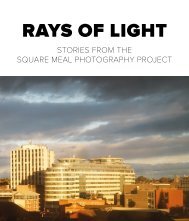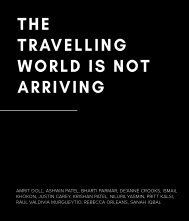Coming of Age : 1976 and the Road to Anti-Racism
Coming of Age : 1976 and the Road to Anti-Racism by Jagdish Patel and Suresh Grover
Coming of Age : 1976 and the Road to Anti-Racism
by Jagdish Patel and Suresh Grover
You also want an ePaper? Increase the reach of your titles
YUMPU automatically turns print PDFs into web optimized ePapers that Google loves.
The Pops - it was timed <strong>to</strong> coincide with <strong>the</strong> Caribbean’s largest <strong>and</strong> most famous carnival in Trinidad.<br />
The brief introduc<strong>to</strong>ry statement <strong>to</strong> <strong>the</strong> souvenir brochure came with <strong>the</strong> title “A Peoples’<br />
Art is <strong>the</strong> Genesis <strong>of</strong> <strong>the</strong>ir Freedom”. Here we reproduce Claudia’s words from <strong>the</strong> brochure.<br />
This relationship between art, culture <strong>and</strong> politics has always been an integral part <strong>of</strong> <strong>the</strong> anti<br />
racist struggle. One person who unders<strong>to</strong>od this was ano<strong>the</strong>r Trinidadian, John la Rose. After<br />
he passed <strong>the</strong> Guardian wrote, “John La Rose was <strong>the</strong> elder statesman <strong>of</strong> Britain’s black<br />
communities. Like Marcus Garvey, CLR James, George Padmore, Fidel Castro <strong>and</strong> Frantz<br />
Fanon, John belongs <strong>to</strong> a Caribbean tradition <strong>of</strong> radical <strong>and</strong> revolutionary activism whose<br />
input has reverberated across continents. The depth <strong>and</strong> breadth <strong>of</strong> his contribution <strong>to</strong> <strong>the</strong><br />
struggle for cultural <strong>and</strong> social change, for racial equality <strong>and</strong> social justice, for <strong>the</strong> humanisation<br />
<strong>of</strong> society, is unparalleled in <strong>the</strong> his<strong>to</strong>ry <strong>of</strong> <strong>the</strong> black experience in Britain.” One <strong>of</strong><br />
John’s favourite sayings was “We didn’t come alive in Britain,” an allusion <strong>to</strong> <strong>the</strong> struggles<br />
that had been waged by Caribbean peoples in <strong>the</strong> Caribbean against colonialism <strong>and</strong> for<br />
workers’ <strong>and</strong> people’s power, something which had began with <strong>the</strong> first Carribean labour<br />
movements in 1919. In <strong>the</strong> 1940s in Trinidad, he helped <strong>to</strong> found <strong>the</strong> Workers Freedom Movement<br />
<strong>and</strong> edited its journal, Freedom. John’s influence on British anti-racism from <strong>the</strong> 1960’s<br />
through <strong>to</strong> <strong>the</strong> 1990’s has not been given <strong>the</strong> acknowledgement it deserves <strong>and</strong> we are<br />
grateful <strong>to</strong> Dr Gus John for his article charting John’s journey through art, culture <strong>and</strong> politics.<br />
18 | <strong>Coming</strong> <strong>of</strong> <strong>Age</strong><br />
<strong>Coming</strong> <strong>of</strong> <strong>Age</strong> Final version 16.10.indd 18 17/10/2017 12:06







